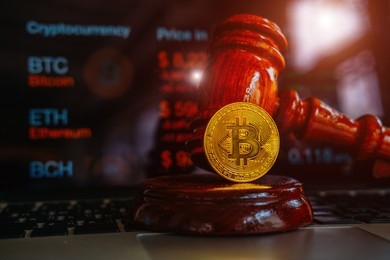To bolster investor protection and promote transparency, South Korea’s Financial Services Commission (FSC) has issued a notice requiring crypto investors to receive interest on their deposits when utilizing exchanges.
The FSC plans to release the legislative guidance for the “Enforcement Decree and Supervision Regulations of the Virtual Asset User Protection Act” containing these provisions. The new rules are set to take effect from July 2024.
Financial Institutions To Pay Interest On Crypto Deposits
According to a local media report, under the revised regulations, investors in crypto assets will be entitled to interest payments on their deposited funds. However, non-fungible tokens (NFTs) and deposit tokens linked to central bank digital currency (CBDC) will be excluded from the scope of digital assets covered by the law.
Financial institutions serving as banks for crypto exchanges will be obligated to pay interest on user deposits made through the exchanges. This move aims to ensure that user funds are adequately protected and enable investors to earn returns on their capital.
To enhance security and mitigate risks, crypto asset operators must store over 80% of the economic value of users’ virtual assets in cold wallets.
Moreover, in light of potential hacking incidents, digital asset operators must also obtain insurance coverage or establish mutual aid programs. They are required to insure or accumulate reserves amounting to more than 5% of the economic value of virtual assets stored in hot wallets.
Minimum standards have been set at 3 billion won ($2.6 million) for won market exchanges and 500 million won ($433,000) for coin market exchanges or wallet/custodian services.
Insider Trading Controls Strengthened
The new regulations also address insider trading concerns by stipulating that important information shared by digital asset businesses on exchanges will be considered public knowledge after a six-hour disclosure period.
Blocking users’ deposits and withdrawals will be prohibited in principle. Exceptions may be made in cases of computer failures or hacking incidents or when requested by courts, investigative agencies, or financial authorities in accordance with relevant laws and regulations.
Furthermore, crypto exchanges must monitor and report any abnormal transactions, promptly notifying financial authorities of any suspected unfair trade practices.
This measure aims to prevent market manipulation and ensure a fair trading environment for investors. digital asset deposit and management businesses that have faced controversy for suspending deposits and withdrawals without notice, such as Haru Invest and Delio, will be prohibited from engaging in such practices.
Ultimately, the FSC’s comprehensive regulatory framework seeks to establish a robust and secure environment for digital asset investors in South Korea.
By introducing interest payments on deposits and implementing enhanced oversight, the FSC aims to foster trust, protect user funds, and promote the responsible growth of the nascent cryptocurrency market.
Featured image from Shutterstock, chart from TradingView.com








